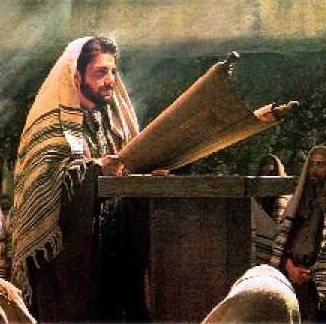JC & the Law: teaching in the Temple … (12/19/18)
It is interesting (and quite telling as well) that Jesus is only seen reading Scripture in a synagogue once in the entire Bible (see Luke 4:16-211) and that the passage he therein chooses to read is a most meaningful one – first & foremost for its content; which openly claims that he himself had been “anointed” with the spiritual authority required to bring “the good news” (namely, his own unique, anti-establishment construction thereof) not to the priests or the scribes or the Pharisees or the Jewish well-to-do in his community, but rather “to the poor” (Luke 4:18a – juxtapose with the Beatitudes of Matthew 5:3-11 at the very beginning of his infamous Sermon on the Mount). The passage goes on to strongly imply that he had been “sent to proclaim release for those held captive and the recovery of sight for those blinded; to let the oppressed go free and proclaim the year of the Lord’s favor” (Luke 4:18b-19). It is critical for the reader to realize that Jesus was not speaking in a political context here – that he was not speaking of dismantling the Roman persecution of the Jews or of freeing any Jewish prisoners from their Roman prisons. No, he made these claims in a synagogue – not on a street corner, and as such his reading must be seen for what it truly was: namely, a radical call to religious reform; a denouncement of the spiritual enslavement of the Jewish community by the priesthood and a rejection of the liturgical oppression of the Jewish common man by the scribes & the Pharisees. Indeed, this is why he ended his sermon with “Today this scripture has been fulfilled in your hearing” (Luke 4:21), and this is why many Jews in attendance – Jews obviously aligned with the status quo teachings of the religious elite – took aggressive exception to his boldness; driving him out of town thereafter and taking him to summit of a hill that overlooked their synagogue “so that they might hurl him off the cliff” (Luke 4:29).
Just as intriguing is the fact that Jesus did not read from the scroll of Isaiah directly during this brief discourse, but instead intentionally inserted a portion of Isaiah 58:6 (“to let the oppressed go free”) right into the middle of his recitation of Isaiah 61:1-2a – showing thereby in a not-so-subtle (if not purposefully heretical) way that he was the master of the Scriptures; that they were there for his use, not the other way around. Just as intriguing is the fact that he stopped reading Isaiah 61:2 right in the middle of that verse, intentionally cutting its citation short and thereby intentionally leaving out the phrase “the day of vengeance of our God” – a phrase that directly contradicted the all-loving & all-merciful “Father” at the center of his new Gospel (see Matthew 5:44-48 & John 5:22 – along with Luke 6:36 & 1 John 4:18 et al); a phrase that reflected the same fear-based (and even tyrannical) celestial sternness that his ministry was designed to cleanse and replace (see Luke 12:32‘s “It is my Father’s great pleasure to offer you the Kingdom” and even Matthew 11:30‘s “For my yoke is easy and my burden is light”).

……………………………………………………
1As an intriguing addendum, this entire episode takes place in “Nazareth, where he had been raised” (Luke 4:16); intriguing because (as the 4th century historian Jerome pointed out) the “Nazarenes” were a sect of Judaism ever devoutly connected with the honoring of Law, and also intriguing in light of the implications of Matthew 2:23‘s pseudo-prophetic “He will be called a Nazorean.” Oddly enough, there is no such prophecy to be found anywhere in the Old Testament, though some Christian apologists claim it refers to Isaiah 11:1-4 (which states “A shoot shall come out from the stump of Jesse, and a branch shall grow out of his roots. The spirit of the Lord shall rest on him; the spirit of wisdom and understanding … With righteousness he shall judge the poor, and decide with equity for the meek of the earth”, with the “branch” mentioned therein somehow relating to the messianic “branch” mentioned in the supposed prophecies of Jeremiah 23:5-6, Jeremiah 33:15-16, Zechariah 3:8, & Zechariah 6:12). Indeed, the term “Nazorean” is found nowhere at all in the Bible until its mention in Matthew 2, and the Gospel of Mark (the Gospel scholars almost unanimously agree was written before its compatriots, and the Gospel from which the majority of scholars believe the authors of Matthew & Luke copied) contains not a single reference thereto (preferring the usage of “Nazarene” instead, a term with very different implications – see Mark 1:24, Mark 10:47, Mark 14:67, & Mark 16:6).




 ;
;